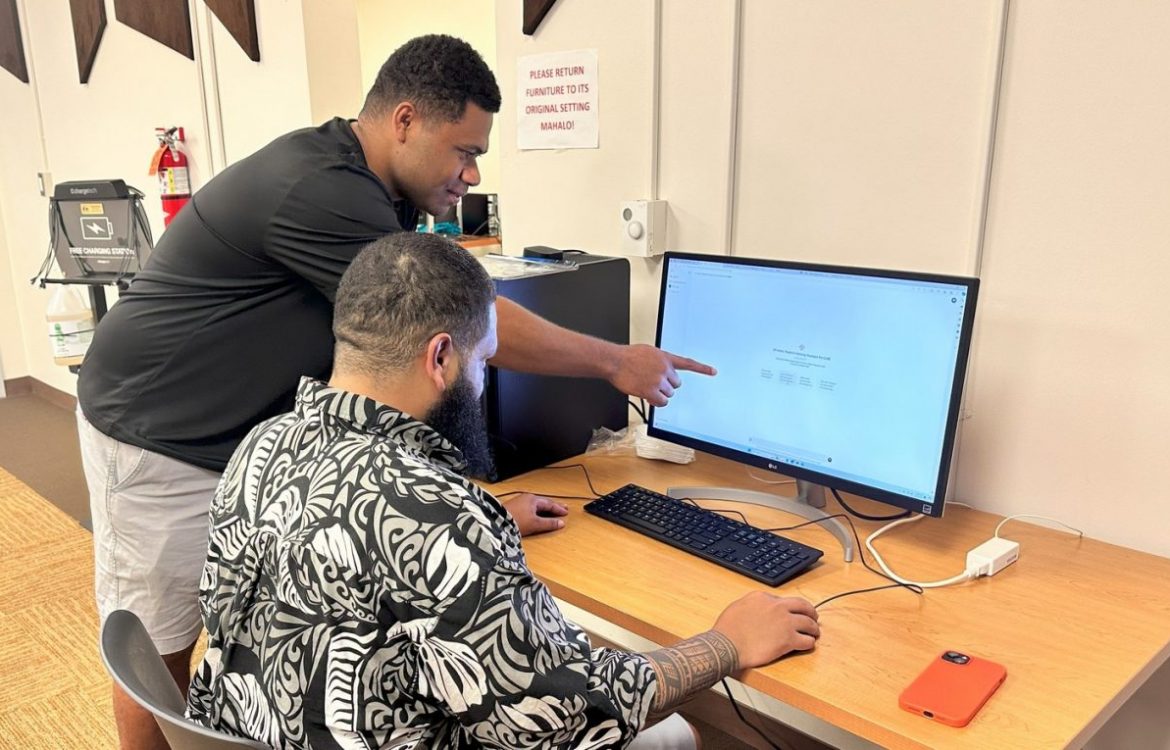
UH Hilo business students develop AI chatbot to assist with academic advising
The goal of the federally-funded summer project was for the student researchers to develop an AI-based chatbot assistant that could provide personalized advice and support to business students.
By Susan Enright.
Three students from the College of Business and Economics at the University of Hawaiʻi at Hilo recently completed a summer program funded by the National Science Foundation that focused on developing artificial intelligence chatbots for UH Hilo business students seeking academic advising or career advice.
Students Jing Feng (marketing major), Ginate Mahuru (management), and Basil Tavake (accounting) were mentored throughout the project by Sukhwa Hong, an associate professor of data science and business, and Helen Tien, an instructor of management and a career advisor for the business college.
“We are confident that this AI driven approach will play a crucial role in enhancing educational experience supporting academic success and other fields by using AI technologies,” says student researcher Mahuru. “We can analyze critical data, generate impactful messages, and provide innovative solutions to real world.”
Preparing the state for paradigm shift
The NSF program funding the summer project is a statewide initiative focused on preparing Hawaiʻi for coming changes due to climate change. Change Hawaiʻi, a five-year $20 million program, is supporting statewide research, education, and workforce training meant to prepare the state for the inevitable paradigm shift in a wide range of areas from economics to government policy.
- UH Hilo awarded federal monies to study climate resilience through data science (UH Hilo Stories, May 19, 2022)
“The NSF-funded Change HI program has been offered at UH Hilo since 2022 under the College of Business and Economics,” says Hong, noting that the summer program, which started in 2020, is funded through the Established Program to Stimulate Competitive Research or EPSCOR that previously supported the ʻIke Wai project, a statewide study into Hawaiʻi’s water resources. “Each year, we strive to expand and improve the program to better meet the needs of our students and the community.”
The 2024 summer project specifically focused on innovative applications of natural language processing and large language models in sustainability and education.
Natural language processing or NLP is an interdisciplinary subfield of computer science and artificial intelligence that provides computers with the ability to process data. A large language model or LLM is a computational model that can achieve general-purpose language generation and other natural language processing tasks such as classification.
Using those AI tools, the student researchers worked with ChatGPT, Microsoft Copilot, and Llama 3, to develop the best advising chatbot.

Using chatbots as a part of effective public communication
Hong says the summer research project by the business students fits in well with Change Hawaiʻi’s goals to prepare the state for climate change because there is a communication piece to the federal program.
“Climate change is a human problem and it is important to effectively communicate scientific findings to lay people in a way they can perceive well so they can change their thoughts and beliefs,” explains Hong. “This could lead to changing their behaviors so maybe they can recycle more or influence policy makers and so on. We are exploring AI and large language models to effectively [communicate] scientific findings to different types of people and this chatbot is a part of the effective communication.”
The goal of the summer program was for the students to develop an AI-based assistant that could provide personalized advice and support to business students, assist Tian with her duties as advisor, reduce staff workloads, and answer questions related to courses, schedules, and resources.
The student researchers say “AI can revolutionize academic advising, making the process more efficient, accessible, and impactful.”

Watch a video presentation by the students about their project, “Chatbots for Academic Advising.” In the presentation, the students discuss:
- The evolution and current state of AI
- Chatbots and their key components
- ChatGPT, Microsoft Copilot, and Llama 3, including their advantages, disadvantages, and use cases
- The project’s goal of developing an AI-based advising assistant to support business students and streamline the advising process
- Testing and feedback from students who interacted with the chatbot during advising sessions
The project was not without challenges. In some instances where creating an effective AI model requires massive amounts of high-quality data, which the students did not have access to, the model was less effective. However, the students still learned much going through the paces of the project and had great success in developing a workable chatbot that students who tested it found user-friendly, easy to navigate, and simple to find information they needed.
Maintaining the chatbot
Hong says upcoming students will be in charge of updating and developing the AI chatbot.
“The college will hire students at the beginning of the fall semester to develop and maintain the chatbots, providing them with hands-on experience and valuable skills in AI and NLP,” says Hong.

Story by Susan Enright, a public information specialist for the Office of the Chancellor and editor of UH Hilo Stories. She received her bachelor of arts in English and certificate in women’s studies from UH Hilo.


